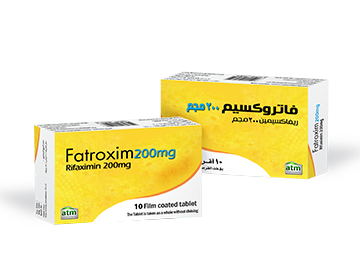
Fatroxim (200 & 550 mg)
Human Drugs
Fatroxim 200 & 550 mg)
Active Ingredient
Fatroxim 200 mg contains Rifaximin 200
Fatroxim 550 mg contains Rifaximin 550
Fatroxim 200 & 550 mg is indicated in treatment of
1. Travelers’ Diarrhea
2. hepatic encephalopathy
3. Irritable Bowel Syndrome with Diarrhea
Pharmacotherabiotic Group
antibacterial drug
Market Name
Fatroxim 200 mg
Fatroxim 550 mg
Dosage Form
Fatroxim is Film Coated Tablets dosage form
Indication
To reduce the development of drug-resistant bacteria and maintain the effectiveness of FATROXIM and other antibacterial drugs, FATROXIM when used to treat infection should be used only to treat or prevent infections that are proven or
strongly suspected to be caused by susceptible bacteria. When culture and susceptibility information are available, they should be considered in selecting or modifying antibacterial therapy. In the absence of such data, local epidemiology and susceptibility patterns may contribute to the empiric selection of therapy.
1. Travelers’ Diarrhea
FATROXIM is indicated for the treatment of travelers’ diarrhea (TD) caused by non-invasive strains of Escherichia coli in adults and pediatric patients 12 years of age and older.
Limitations of Use
FATROXIM should not be used in patients with diarrhea complicated by fever or blood in the stool or diarrhea due to pathogens other than Escherichia coli
2. Hepatic Encephalopathy
FATROXIM
is indicated for reduction in risk of overt hepatic encephalopathy (HE) recurrence in adults.
In the trials of FATROXIM for HE, 91% of the patients were using lactulose concomitantly. Differences in the treatment effect of those patients not using lactulose concomitantly could not be assessed.
Rifaximin has not been studied in patients with MELD (Model for End-Stage Liver Disease) scores >25, and only 8.6% of patients in the controlled trial had MELD scores over 19. There is increased systemic exposure in patients with more severe hepatic dysfunction
3. Irritable Bowel Syndrome with Diarrhea
FATROXIM is indicated for the treatment of irritable bowel syndrome with diarrhea (IBS-D) in adults
Contraindication
FATROXIM
is contraindicated in patients with a hypersensitivity to rifaximin, any of the rifamycin antimicrobial agents, or any of the components in FATROXIM. Hypersensitivity reactions have included exfoliative dermatitis, angioneurotic edema, and anaphylaxis .
Pregnancy & Lactation
There are no available data on Rifaximin use in pregnant or breast feeding women to inform any drug associated risks
Mechanism of Action
FATROXIM has Rifaximin which is an antibacterial drug of the rifamycin class that irreversibly binds the beta sub-unit of the bacterial enzyme DNA-dependent RNA polymerase and consequently inhibits bacterial RNA synthesis.
Rifaximin has a broad antimicrobial spectrum against most of the Gram-positive and negative, aerobic and anaerobic bacteria, including ammonia producing species. Rifaximin may inhibit the division of urea-deaminating bacteria, thereby reducing the production of ammonia and other compounds that are believed to be important to the pathogenesis of hepatic encephalopathy
© Copyright 2022. All Rights Reserved.
